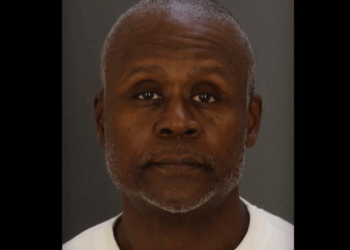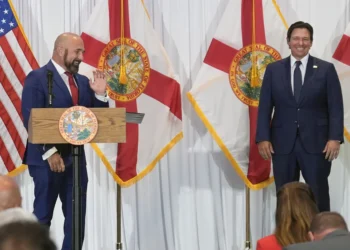Editor’s note: CDR Phillip Keuhlen authored a handful of analysis articles for our Guest Commentary section. His friend, Brent Ramsey, has been a regular contributor for the last 18 months.
It is with a heavy heart that I advise our Patriot Post readers of the following statement provided to Calvert Task Group regarding one of our outstanding guest columnists: “At 1600 on June 21, at home and surrounded by his wife Susan and family, with a beautiful view of the Pacific Northwest countryside, Phil Keuhlen set sail and slipped over the bar. It has been said that sometimes you will never know the true value of someone until they become a memory. What you leave behind is not what is engraved in stone monuments but what is woven into the lives of others. Phil Keuhlen wove much into the lives of many.”
Phil came from Navy roots, his father having seen extensive combat experience in submarines in WWII. He was selected for and attended the United States Naval Academy, graduating in 1971 with a degree in Political Science. While at USNA, he demonstrated early on his commitment to principle. As a midshipman, Phil, along with six classmates, filed a complaint regarding mandatory Chapel attendance by midshipmen every Sunday. A lifelong Catholic, Phil and his co-complainants felt mandatory Chapel attendance was not consistent with the Constitution and should be eliminated. In 1972, the courts agreed, and the practice was discontinued. How remarkable for a young midshipman (and a few friends) to possess the insight and bravery to contend with the establishment and win.
Graduating from the Naval Academy in 1971, Phil pursued a career in the Navy’s nuclear submarine force, arguably the Navy’s most highly selective and demanding field. In those days, Admiral Hyman Rickover (the Father of the United States Nuclear Navy) personally selected every officer for the Navy’s critical nuclear power program. Admiral Rickover selected Phil to be in his nuclear Navy.
After graduating from Nuclear Power School, he went to sea and served in ever-increasing roles on nuclear-powered submarines, leveraging his technical and leadership skills gained at the United States Naval Academy. Phil attended graduate school at the Naval Postgraduate School, Monterey, California.
Phil achieved the rank of Commander and achieved the signal accomplishment of command of a nuclear-powered submarine, the USS Sam Houston (SSN-609), a special operations submarine. Originally a Fleet Ballistic Missile Submarine, the Sam Houston was converted to special operations in the mid-1980s. This special operations submarine, under Phil’s command, conducted operations critical to national security during the Cold War. His command performed specialty work that no others could, including cable operations, surveillance missions of enemy vessels, and installations. They even practiced their stealth craft on U.S. Navy capital ships, and those ships were none the wiser that they had been not only surveilled and extensively photographed from every angle but never had a clue they were being tracked. They did special operations, worked with mini-subs, and delivered special forces into clandestine locations by unconventional means. Most of the work done under his command during this timeframe was and remains classified. To say that it was extraordinarily dangerous and sensitive would be an understatement.
His walls at his home are decorated with multiple citations that lack specificity. They are citations for multiple Navy Unit Commendations, but the narrative is bland and non-descriptive. That is because the work being praised was classified at the very highest levels, and the citation could not actually describe the events for which the award was given. Phil’s personality was that of a quiet, unassuming, even shy man. Nothing could be further from the truth. Phil was a warrior’s warrior with the heart of a lion and nerves of steel. He lived an exciting, daring, and dangerous life during this time frame, and to understand his role and that of his command and the nature of the work that was done, readers of this tribute are urged to read the book Blind Man’s Bluff: The Untold Story of American Submarine Espionage.
Phil would not talk much about this episode of his life, but his family knows what he risked and what he did for his country that was above and beyond the call of duty. His command role and strategic assignments with the Pacific Fleet Submarine Force exemplified his superior qualifications and devotion to the Navy’s core values of honor, courage, and commitment. His leadership in critical missions and contributions to national and allied defense earned him multiple awards and a lasting legacy among his peers.
After retiring from the Navy, Phil enjoyed many years of critical senior management experience in the complete life cycle of nuclear reactors, laboratories, processing plants, and high-hazard NBC waste sites. His expertise spanned technology development, EPC project management, operations and maintenance, safety, health and quality, and decommissioning, decontamination, and disposal. Phil’s study of the byproducts of the nuclear industry and technology was such that he single-handedly prevented catastrophic accidents involving nuclear waste that would have happened had he not presented the science to top management, which prevented mistakes.
He was a senior manager in AECOM (and legacy companies URS, Washington Group International, and Westinghouse), supporting the USDOE at the Savannah River and Hanford sites. He led the introduction of processes for Conduct of Operations and Maintenance at the Savannah River National Laboratory, decommissioned highly contaminated pilot plants, and was a principal developer of SRNL’s Conduct of R&D Program for integrated safety management of research. He also supported Los Alamos National Laboratory as an external reviewer evaluating the LANSCE Accelerator facility management.
At Hanford, Phil held a variety of postings. He was seconded to Bechtel as the Area Project Manager for the Analytical Laboratory nuclear facility at the $12.6 billion Waste Treatment Plant (WTP). He took that $500 million project from pre-authorization into construction. He was responsible for industrial, radiological, security, and nuclear safety programs for the $1.9 billion River Corridor Closure Project. Returning to WTP, he led testing of pulsed jet mixer technology. In these leadership positions, Phil developed strong links with industry leaders across the nation.
He was a specialist in organizational development, design, construction, operation, and maintenance of nuclear facilities, pilot and full-scale testing, and technology development. When not working, Phil excelled in pursuing his love of shooting, and like everything else he did, he was outstanding, being highly ranked nationally in small-bore rifle competitions.
In the last few years of his life, Phil was a charter member of the Calvert Task Group, a fraternity of naval officers, mostly Naval Academy graduates, concerned with restoring merit in the military and improving the state of the Navy and the nation. Phil’s contributions to the group were many, and his brilliant writing and editing were instrumental in the success of our book, Don’t Give Up the Ship.
Phil maintained close contact with his alma mater, the United States Naval Academy, and in recent years promoted and prodded USNA to reassess its position on political influences that had taken root at the Academy. Phil was a prolific writer and published authoritative articles on defense matters with many publications including RealClearDefense, the United States Naval Institute Proceedings, The Patriot Post, Luccianne.com, Highland County Press, Times-Leader, STARRS, Calvert Task Group, United States Naval Academy At Large forum, American Greatness, and Association of Mature American Citizens.
Shipmates remember Phil:
- I did not know Phil until the Calvert Group came into existence, and it is my great loss to have come so late to the feast. I was blessed by exposure to a man of great diligence, surpassing intellect, and the kindness that can only be termed saintly. When asked for assistance, his response was as certain as the sunrise, as lacking of prepossession as a child, and as solid as an oak. We are now missing a real man, and Heaven is graced with our loss.
—Strength & Honor, Blue Angel Bruce Davey, Calvert Task Group, USNA ‘69
- In so many ways, Phil was smart, savvy and driven. … What Calvert has accomplished will be remembered. You men have lived up to JPJ… And Phil. I can think of no greater honor.
—Tex (Phil’s brother), USNA ’78
- Phil will be sorely missed. Some may not know, but he was key to the development of Don’t Give Up the Ship. Way back when, we had only about 20 essays, and we polled the authors for their willingness to have their work included in a book. Phil was the only one who said NO. He told us that the book was not ready for “prime time,” but he gave us a set of suggestions as to what needed to be fixed. We took his sage advice, and the rest is history. Not only that, he was among our best writers. If you have not read his essay, “Which United States Constitution?” (my personal favorite), read it. If you have already read it, read it again in his memory. It’s a classic. Thank you, Phil. Rest in peace.
—Jim Tulley, Calvert Task Group, USNA ’69
- I, too, did not know Phil until CTG started to get serious. And if nothing else, Phil was one of the most silently serious people I ever met, a trait that Admiral Rickover recognized and promoted. I became aware of his extreme heart failure issues a couple of years ago, and, like the rest of his life, he conducted this battle silently and never let it affect the brilliance of his writing. So sorry I missed most of his life.
—Bill McCauley, Calvert Task Group, USNA ’69
- Very sad news. We have lost a gifted writer for the cause, a great warrior, and a wonderful man. Rest In Peace, Phil Keuhlen.
—Sam Thiessen, STARRS and MacArthur Society, USMA ’73
- Phil was a steadfast American patriot. He lived a life defined by unwavering virtue, unshakable principles, and a deep devotion to the ideals that built our nation. With a heart committed to service and a mind guided by integrity, he championed the values of liberty, duty, and honor in every endeavor. His extraordinary contributions to our country — whether through military service, civic engagement, or quiet acts of leadership — left an enduring legacy of courage and conviction. Yet, it was through his writing that his soul most clearly spoke: with eloquence, clarity, and fierce honesty, he captured the essence of the American spirit, inspiring generations to think more deeply, act more bravely, and love this country more fully. I was honored to know the man through our work with the Calvert Task Group.
—Fred Stuvek Jr., Calvert Task Group, USNA ’74
- The Navy and the Nation have lost a brave warrior, a brilliant scholar, a determined and principled constitutionalist, and a perceptive commentator on the state of the union. No one cared more deeply for the Navy or the Constitution than Phil. Despite severe health challenges, he toiled tirelessly to bring truth to Navy leadership and to help restore our nation and the Navy to its core values. He will be sorely missed. Fair winds and a following sea, Phil. We will see you by and by.
—Brent Ramsey, Calvert Task Group, NROTC UNL ’69
- To all of us, Phil was a true Patriot, a brilliant writer, a bold warrior, and a great friend. True friends are always together in spirit. It may be a long walk, but our paths will cross again. Rest in Peace, our Shipmate Phil.
—Tom Burbage, President, Calvert Task Group, USNA ’69
















